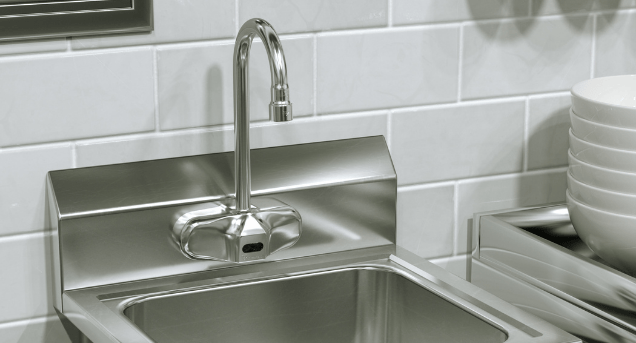
Sensor faucets have been popping up with increasing frequency over the last two years — fuelled in no small part by the pandemic and the increased urgency many facility operators feel to promote and protect hygiene.
Despite this ongoing surge, the restaurant back-of-house is one of the final frontiers for sensor faucets.
The sturdy kitchen hand wash sink is often specified with traditional manual faucets. But many of the same benefits sensor faucets bring to other facilities are also uniquely valuable in foodservice applications. Today’s sensor faucets can be the workhorse and not just the show pony — helping restaurants function better and more efficiently.
Think of the workers handling something like raw chicken. They go to the hand sink, turn on the faucet to wash their hands and then turns the water back off — retouching the area where dirty hands had first turned the faucet on. Sensor faucets can reduce or eliminate that contamination risk.
Sensor faucets in the commercial kitchen
Hygiene
As food safety concerns have been amplified by highly publicized outbreaks of foodborne illnesses, it’s never been more important to support and encourage good hygiene and handwashing in restaurants to protect safety and reputations.
The spread of germs from hands to food is a significant contributor to foodborne illness outbreaks in restaurants, directly causing 89 percent of the outbreaks in which food was contaminated by workers, according to the Centers for Disease Control and Prevention (CDC).
Major health organizations, including the CDC and the World Health Organization (WHO), acknowledge the critical role of handwashing in reducing illness. “Handwashing is the single most important means of preventing the spread of infection,” the CDC says.
But even good handwashing habits can be undermined by contaminated faucet handles.
This risk is why hygiene experts, as well as the 2017 Food and Drug Administration (FDA) Food Code, recommend manual sink faucets and other surfaces not be touched by bare hands after handwashing. Instead, users are advised to use a paper towel to shut off water or open door handles. In practice, this advice is often unknown or ignored.
Since hands-free sensor faucets eliminate the faucet touchpoint, the risk of recontamination is greatly reduced. In fact, a 2017 FDA study revealed that touchless faucets and doors were more efficient in reducing the number of infected customers in restaurants than other methods.
Ease of use
As critical as safety is in commercial kitchens, speed and efficiency are also significant drivers of worker behavior.
A CDC study showed that food workers washed their hands in only about a quarter of the situations that should have involved handwashing. And the belief that it takes too much time was among the potential reasons cited for the gap.
Sensor faucets streamline basic water access and can cut down on the perception of handwashing as a time-consuming activity, thus inviting more frequent handwashing.
Another CDC study revealed that sink accessibility was related to handwashing, which suggests that the physical location of sinks and the sink’s ease of use can play a role in appropriate handwashing.
Sustainability
In addition to improving hygiene, sensor faucets can improve an operation’s bottom line through water and energy conservation.
Water used in restrooms and other “domestic” activities like handwashing accounts for 31 percent of all water consumed in restaurants, according to the Environmental Protection Agency (EPA).
Since water is flowing only when it’s needed, sensor faucets save up to one gallon of tempered water per 20-second handwash. The savings extend beyond the cost of water alone to include associated sewer costs and energy costs to heat the water.
Multiplied by the number of workers and handwashes per shift across multiple locations, the conservation impact can be significant.
Learn more about the appropriate sensor faucets for kitchens and any other environment from the experts at T&S Brass.
